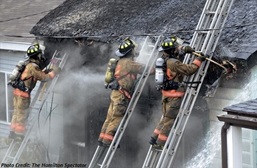
What is the problem?
Firefighters are at high risk of suffering from a musculoskeletal injury (muscle and bone-related injuries). Musculoskeletal injuries are generally described as musculoskeletal disorders (MSDs). These MSDs (sprains, strains, sore joints) are the most common injuries during training and fireground operations. The purpose of this study was to calculate an average number to describe the frequency of MSDs that men and women firefighters have reported during their careers in fire services across Canada.
How did the team study the problem?
We searched health sciences electronic databases for articles published from January 1998 to November 2018 to identify studies that assessed the rates of MSDs among Canadian firefighters. We found many studies that mentioned fire or firefighters but only 5 studies with Canadian firefighters were included. Two researchers recorded all the key information about these studies: what were the rates of MSDs, who participated, what were the results?
What did the team find?
We found 2 studies that reported MSDs rates in Calgary Alberta; 1 study in Hamilton Ontario; and 2 studies that reported rates of MSDs across Canada. The total number of firefighters included in these 5 studies was 4143. The total rate of neck pain was 17% (men = 18.6%, women = 23.4%). The rate of shoulder pain was 23% (men = 28.6%, women = 23.7%). The total rate of back pain was 27% (men = 31.6%, women = 42.6%). The overall rate of knee pain was 27% (men = 29.0%, women = 21.0%). We also found high rates of sprain/strain injuries with 1 in 10 firefighters reporting sprain/strain injuries.
How can this research be used?
This FIREWELL study shows high rates of MSDs among firefighters across Canada. Results from this study show the need for firefighter-specific MSD injury prevention programs or resources. Our findings also support the need to provide firefighters access to rehabilitation services to help them manage their MSD injuries.
Cautions
Our study measured the frequency and bodily location of MSDs and not the degree to which these injuries affected firefighters. It is also possible that some firefighters might have been off duty at the time of this study and, therefore, were unable to provide us their injury history.
Funding Sources: Canadian Institutes for Health Research (FRN: HPW – 146016). Joy C. MacDermid was supported by a CIHR Chair in Gender, Work and Health and the Dr. James Roth Research Chair in Musculoskeletal Measurement and Knowledge Translation.
